 Petzlover
Petzlover Cabecudo Boiadeiro is originated from Brazil but Greater Swiss Mountain Dog is originated from Switzerland. Both Cabecudo Boiadeiro and Greater Swiss Mountain Dog are having almost same height. Cabecudo Boiadeiro may weigh 12 kg / 27 pounds more than Greater Swiss Mountain Dog. Both Cabecudo Boiadeiro and Greater Swiss Mountain Dog has same life span. Both Cabecudo Boiadeiro and Greater Swiss Mountain Dog has same litter size. Cabecudo Boiadeiro requires Low Maintenance. But Greater Swiss Mountain Dog requires Moderate Maintenance
Cabecudo Boiadeiro is originated from Brazil but Greater Swiss Mountain Dog is originated from Switzerland. Both Cabecudo Boiadeiro and Greater Swiss Mountain Dog are having almost same height. Cabecudo Boiadeiro may weigh 12 kg / 27 pounds more than Greater Swiss Mountain Dog. Both Cabecudo Boiadeiro and Greater Swiss Mountain Dog has same life span. Both Cabecudo Boiadeiro and Greater Swiss Mountain Dog has same litter size. Cabecudo Boiadeiro requires Low Maintenance. But Greater Swiss Mountain Dog requires Moderate Maintenance
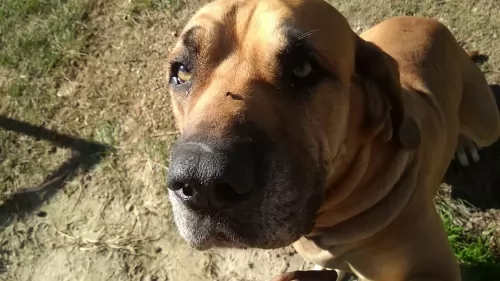 The Cabecudo Boiadeiro has always played an important role in the management of livestock. Stockdogs like this were known in parts of Minas Gerais as early as the 18th century. In fact reports tell us that the Cabecudo has existed since the 16th century as a working dog in the rural parts of Brazil.
The Cabecudo Boiadeiro has always played an important role in the management of livestock. Stockdogs like this were known in parts of Minas Gerais as early as the 18th century. In fact reports tell us that the Cabecudo has existed since the 16th century as a working dog in the rural parts of Brazil.
The Capecudo has remained much the same over the centuries – a dog created as a guardian for large properties, as a game hunter and livestock herder and protector. Today this Molosser dog still drives cattle in Brazil.
 Hailing from Switzerland, and one of its oldest dog breeds, the Greater Swiss Mountain Dog has a dubious history in that there are a number of theories as to its origin. He is closely related to the Bernese Mountain Dog, Saint Bernard and Rottweiler.
Hailing from Switzerland, and one of its oldest dog breeds, the Greater Swiss Mountain Dog has a dubious history in that there are a number of theories as to its origin. He is closely related to the Bernese Mountain Dog, Saint Bernard and Rottweiler.
Of all the theories, the one that says he is descended from large, mastiff-like dogs is a popular one. He used to be a herding- and guard dog, but also was used to pull carts of farm produce.
It was in the 1900s that the dog’s numbers started dwindling. In 1908, canine researcher, Albert Heim recognized the dogs as being large members of the Sennenhund type, a family of four breeds that includes the Greater Swiss Mountain Dog.
He wanted to see the dogs recognized as a separate breed and the Swiss Kennel Club listed the Greater Swiss Mountain Dog in 1909.
In 1968 they were brought to the United States and a club for them was formed. The dog was recognized by the American Kennel Club in 1995 with the dog being recognized as a member of the Working group.
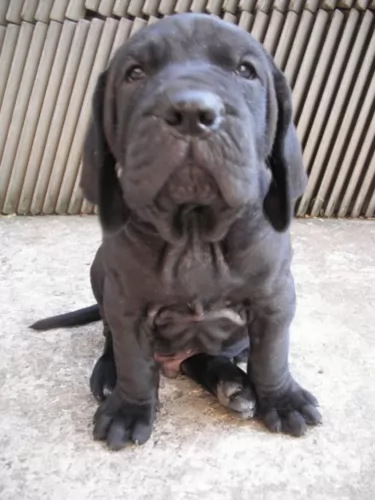 The Brazilian Cabedudo is a strong boned, large dog with a large head and a deep chest. The coat of the dog is short and dense and in wheat-colored shades or fawn shades, while brindle is also in existence. The Cabeçudo Boiadeiro is also known as the Brazilian Mastiff and is a large, imposing dog.
The Brazilian Cabedudo is a strong boned, large dog with a large head and a deep chest. The coat of the dog is short and dense and in wheat-colored shades or fawn shades, while brindle is also in existence. The Cabeçudo Boiadeiro is also known as the Brazilian Mastiff and is a large, imposing dog.
Because the breed was created from a blend of the English Mastiff, the Bulldog and the Bloodhound, not only is this a large dog in height, but a big boned dog as well. He has short to medium length floppy ears and a long tail.
The Brazilian Cabedudo is a courageous dog. When he has been properly trained and socialized, this large dog is capable of becoming an obedient, loving and devoted family pet who is able to get along with children and other pets too. He reserves this gentler side of him for his human family and won’t easily tolerate strangers.
 Swissies, as they are often referred to as, are large, robust dogs, standing at 65–72cm and weighing anything between 50 – 70kg, with the females being slightly smaller and weighing a little less.
Swissies, as they are often referred to as, are large, robust dogs, standing at 65–72cm and weighing anything between 50 – 70kg, with the females being slightly smaller and weighing a little less.
He has big, rounded paws, medium length floppy ears, a broad chest and a long tail. This is a heavy-boned dog, strong while still being agile.
His dense, double coat is black, white and tan or rust, with black on top of the dog's back, ears, tail and legs. There are two rust dots above each eye. The coat can be short and straight to medium length, coarse and wavy. The dog sheds throughout the year with a major shedding a couple of times a year.
The Greater Swiss Mountain Dog is a sociable canine, thriving on being part of a loving human family. While he used to be a working farm dog, today he is essentially a family pet, though he loves to still be busy.
He is generally friendly with strangers, but just like with all other dog breeds, he will need to be trained and socialized to turn him into an even-tempered, obedient dog, capable of getting on well with children and pets in the the home.
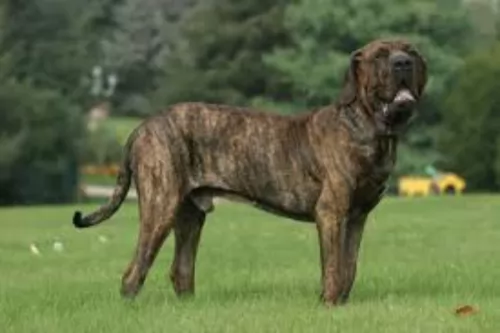 Deciding to become an owner of a dog is a big responsibility, as you are going to have your pet with you for 10 – 15 years at least. There are so many essentials to remember with owning a dog and most dogs are far happier and healthier when allowed to live part of the time indoors with their human family.
Deciding to become an owner of a dog is a big responsibility, as you are going to have your pet with you for 10 – 15 years at least. There are so many essentials to remember with owning a dog and most dogs are far happier and healthier when allowed to live part of the time indoors with their human family.
It's not always easy being a large dog such as the Cabecudo Boiadeiro, as people often assume these mastiff-type dogs are unfriendly and aggressive.
Every dog breed however, is essentially the product of his owners lifestyle and his unique upbringing with them. When this large pet is properly trained and socialized and he is loved and well cared for, he promises to be faithful, devoted, playful and loving – a real friend and protector.
 The Swissy is an easy going dog and adapts easily into his human family’s lifestyle. He is big, but agile dog known for his gentle temperament.
The Swissy is an easy going dog and adapts easily into his human family’s lifestyle. He is big, but agile dog known for his gentle temperament.
While he loves the outdoors, he is a social dog and loves nothing more than coming indoors and being close to his human family.
He loves his family and won’t do well if left outside for days without human companionship. Treat him well and you’ll be rewarded with a loyal, loving 4-legged family member.
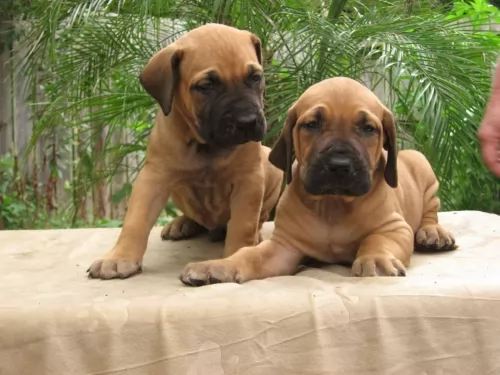 The Cabecudo Boiadeiro is considered a robust breed, used to lots of exercise while herding livestock. With good care and plenty of exercise he can live to 10, 11 or 12 years of age. He is a large breed and this fact alone will ensure that you be aware of some dog illnesses prone to larger breeds.
The Cabecudo Boiadeiro is considered a robust breed, used to lots of exercise while herding livestock. With good care and plenty of exercise he can live to 10, 11 or 12 years of age. He is a large breed and this fact alone will ensure that you be aware of some dog illnesses prone to larger breeds.
This is an orthopedic condition where the hip joints don’t fit properly into the hip joint. Larger breeds such as the Cabecudo Boiadeiro are at a higher risk of getting this orthopaedic disorder.
You’ll see your dog battling to move around and he may not even be able to get up again after lying down. Sometimes a dog might even require surgery. Thankfully, there is testing for hip dysplasia in dogs, and you can ask to see a clearance certificate if you buy your puppy from a so-called reputable breeder.
Progressive retinal atrophy (PRA) is a degenerative eye disorder that can actually lead to blindness in your pet. Night blindness sets in and your dog becomes unsure how to walk in unfamiliar areas, You'll notice that his eyes become gray or cloudy-looking as though there is a film over the eyes. Parent dogs with this eye disease should be spayed or neutered.
 The GSMD or Sennenhund, as his name is shortened to, is a fairly healthy dog breed, with very few health issues.
The GSMD or Sennenhund, as his name is shortened to, is a fairly healthy dog breed, with very few health issues.
He has an average lifespan of 10 to 12 years, and although not likely, he can suffer from minor problems such as gastric torsion as well as female urinary incontinence. If your female dog is dribbling urine in her sleep, there are a number of reasons that can be causing it - bladder infections, a medical condition or a weakened bladder with spayed female dogs.
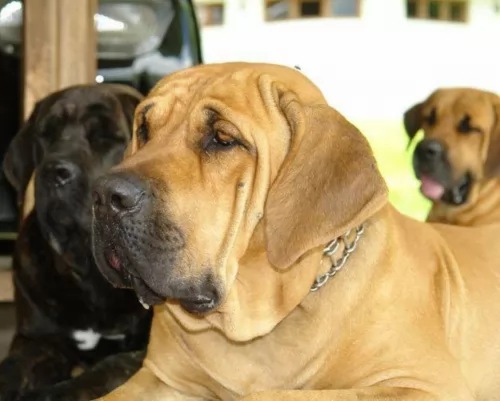 The Cabecudo Boiadeiro is a large breed dog. In spite of his size though, he is surprisingly an active dog. He will need regular exercise such as a brisk walk very day. You can also put aside time to give him some exciting ball games. He is a breed used to working so he will be most unhappy lying around doing nothing.
The Cabecudo Boiadeiro is a large breed dog. In spite of his size though, he is surprisingly an active dog. He will need regular exercise such as a brisk walk very day. You can also put aside time to give him some exciting ball games. He is a breed used to working so he will be most unhappy lying around doing nothing.
If you are going to be feeding your Cabecudo Boiadeiro commercially manufactured good, make sure it is the best quality food. Always go for dog foods which have all the nutrients your large dog requires.
You get wet, dry and raw complete foods and you can give your pet a mix of these. Always make sure that your pet gets some raw meat in from time to time too, otherwise he could battle with skin diseases.
If you aren’t sure how to feed such a large dog, your veterinarian will help you decide which category of food would suit your pet. Clean, cool water is to be provided constantly.
 The Greater Swiss Mountain Dog is a robust dog and thrives on a diet of kibble to raw meat to some cooked home-made food such as chicken, brown rice and vegetables.
The Greater Swiss Mountain Dog is a robust dog and thrives on a diet of kibble to raw meat to some cooked home-made food such as chicken, brown rice and vegetables.
A serious issue with the GSMD is overfeeding, resulting in uncomfortable digestive problems and of course, obesity.
Your GSMD isn’t a dog that is going to require a lot of exercise like some of the other dog breeds there are, but still his working career of the past requires that he still be taken on daily walks, enjoys ball- and rope games and to go swimming.
Brush your dogs coat at least twice a week to remove loose hears. Other grooming aspects include cleaning the ears to avoid infection, clipping his nails and brushing his teeth at least twice a week.
If you’re not sure how to do all these things, there are useful accessories for dogs that allow you to do all this grooming on your own. Your vet can also show you how as these are all things that will require ongoing attention.